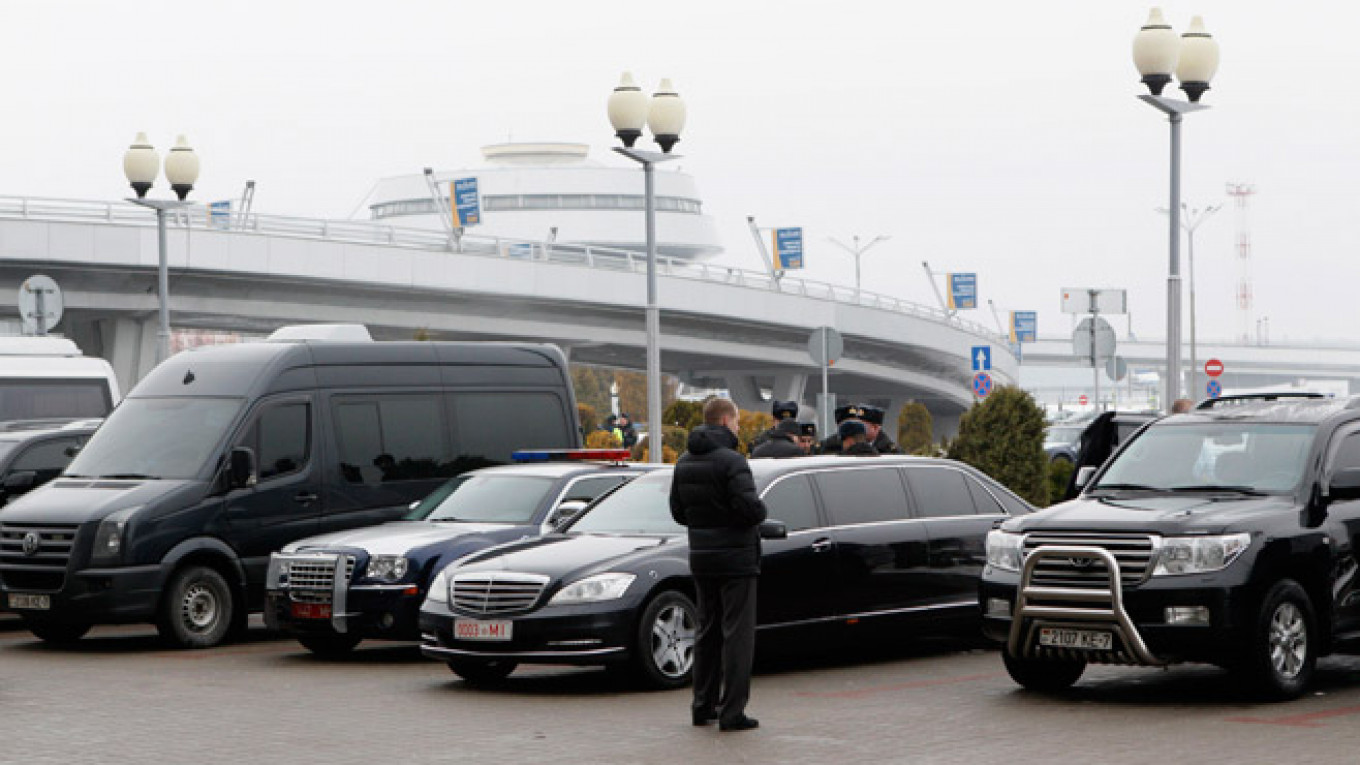U.S. President Barack Obama has claimed the Kremlin's role in the Ukraine crisis brought the Russian economy to its knees. So, if a peace accord is reached in Minsk on Wednesday will it reboot the Russian economy?
Hopes are high that a gathering of Russian, French, German and Ukrainian leaders in the Belarussian capital Wednesday will end bitter fighting in eastern Ukraine.
Western sanctions on Moscow over its role in the Ukraine crisis have have hit Russia's economic prospects hard, weakened the ruble and depressed stock markets.
The effect of the Ukraine crisis has been compounded by a collapse in oil prices.
But analysts and experts cautioned that there was no magic formula for the Russian economy, and the failure of a September agreement in Minsk did not bode well for this week's talks.
"The Russian economy does not have any link to the Minsk negotiations," said Mikhail Khazin, an economist and the president of consulting firm Neokon.
Tensions over Russia's annexation of the southern Ukrainian region of Crimea last year and ongoing fears over a new aggressive foreign policy from the Kremlin are also likely to weigh on the Russian economy — whatever the outcome in Minsk.
But pessimism aside, an agreement in Belarus could mark the beginning of a return to health for the Russian economy. The Moscow Times picked three areas to watch.
Market Rebound
A decisive agreement is likely to have an immediate impact on stock markets and the ruble.
Russian stock markets have risen, and the currency strengthened in recent days as shuttle diplomacy between Moscow, Berlin, Kiev and Washington indicated serious diplomatic efforts were under way to seek a deal on Ukraine.
There is plenty of room for a rally. The ruble lost over 40 percent against the U.S. dollar in 2014, and the dollar-denominated RTS Index is down 34 percent over the last year.
Even if a deal is agreed to, though, it must be enforced. A landmark deal signed in Minsk last September was repeatedly violated by both Kiev and the rebels, eventually leading up to today's fierce fighting.
Any accord in Minsk will have "a weak effect on the market because the market will not believe deeply [in the deal] until serious steps are taken to fulfill the agreement," said Maxim Osadchy, the head of the analytical department at Corporate Finance Bank in Moscow.
Sanctions on the Way Out?
The European Union delayed the implementation of new sanctions on a handful of Russian and Ukrainian separatists — announced last week after a recent escalation in violence — to give the Minsk negotiations a chance to achieve a compromise on the ground.
The restrictions include asset freezes and visa bans on 19 individuals and nine organizations, which news agency Reuters reported to be low-level officials and entities, citing diplomatic sources.
EU diplomats have said that the new measures could be annulled if things go well in Minsk, Reuters reported last week.
As well as allowing Russia to avoid more sanctions, a deal in Minsk could hasten the removal of the last three rounds of sanctions imposed on Russia by the EU and United States.
Sanctions have restricted Russian companies from raising money on EU and U.S. capital markets, and blocked economic collaboration in key sectors including defense and energy.
Finance Minister Anton Siluanov said last month that "external shocks" — including sanctions and the falling oil price — had cost Russia about $200 billion.
Economic Lift
If a deal in Minsk leads to a cease-fire on the ground, then the easing of international tensions could contribute to a general Russian economic recovery.
"It could ease pressure on the Russian economy this year and next," said Oleg Kouzmin, chief economist at Renaissance Capital in Moscow.
Russia is suffering from rising capital outflows — topping $150 billion in 2014 — and inflation that in January hit 15 percent, a high not seen since 1999. The economy may shrink by up to 5 percent this year, with Russia's Central Bank seeing a contraction of at least 3 percent.
But Kouzmin warned that the price of oil, Russia's chief export, was key to the country's economic health.
"Oil is still more important than Ukraine," he said.
A Message from The Moscow Times:
Dear readers,
We are facing unprecedented challenges. Russia's Prosecutor General's Office has designated The Moscow Times as an "undesirable" organization, criminalizing our work and putting our staff at risk of prosecution. This follows our earlier unjust labeling as a "foreign agent."
These actions are direct attempts to silence independent journalism in Russia. The authorities claim our work "discredits the decisions of the Russian leadership." We see things differently: we strive to provide accurate, unbiased reporting on Russia.
We, the journalists of The Moscow Times, refuse to be silenced. But to continue our work, we need your help.
Your support, no matter how small, makes a world of difference. If you can, please support us monthly starting from just $2. It's quick to set up, and every contribution makes a significant impact.
By supporting The Moscow Times, you're defending open, independent journalism in the face of repression. Thank you for standing with us.
Remind me later.


